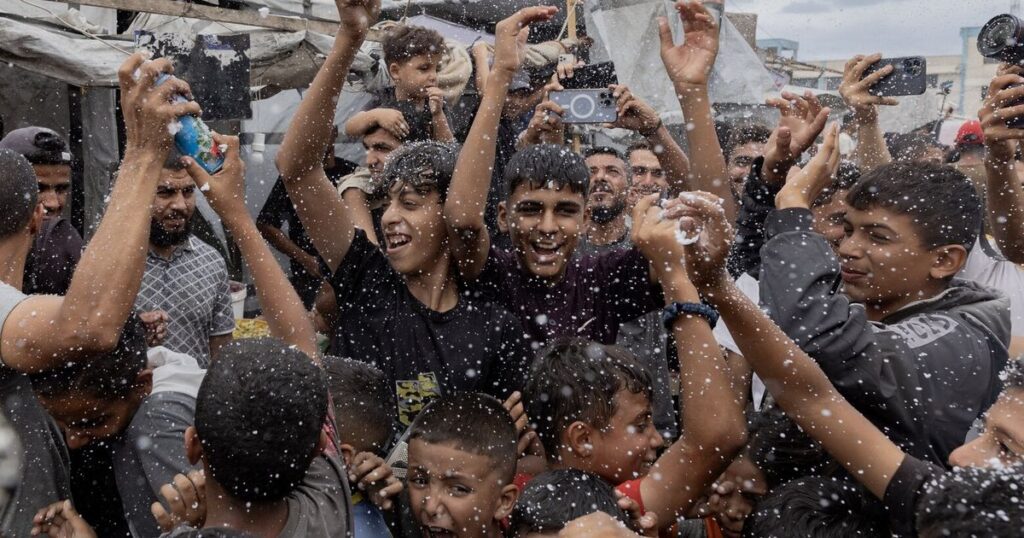TEL AVIV, Israel — Palestinians in the Gaza Strip welcomed the announcement of a deal between Hamas and Israel overnight, but many have questions about what it will mean for them, for their loved ones and for their devastated communities.
The situation had not changed in any material way Thursday — food, water and medicine remained scarce and their cityscapes are ruined — but there were reasons for hope.
“We still don’t understand anything,” said Awni Sami Abu Hasera, 36. He has been living in a shabby tent in Deir al-Balah, in central Gaza, since fleeing Gaza City, where an Israeli ground offensive destroyed his home and once thriving seafood business last month.
“We’re still waking up,” he said. “I don’t see a ceasefire yet.”
In interviews with Palestinians across Gaza, many said the deal had stirred a mixture of relief, joy, disbelief and fear. They said they were desperate for the war to end after the Israeli offensive against Hamas had destroyed much of the territory and killed tens of thousands.
But many added that they were wary of believing any announcement, saying they had experienced false hopes and disappointment before.
It was also hard to fathom what the deal might mean for their families. For Abu Hasera, even if the fighting were to stop, staying in the ruined enclave did not seem like an option, he said.
“As soon as the borders open, I will take my family and leave, anywhere, it doesn’t matter,” he said. “I can’t describe to you what life in a tent and life in displacement really mean.”
Elsewhere in Gaza, others were also skeptical after two years of war.
Maher al-Alami, 53, was listening to the news on the radio with his daughter, Mais al-Reem, 3, when he spoke to The New York Times. His family has lost everything in the war, he said, and he was unsure what the deal could do for them now.
Al-Alami made a comfortable living in real estate and had an apartment in Gaza City, but his neighborhood has been reduced to rubble, he said. His family fled Israeli military strikes 10 times and now lives in a tent in Az Zawayda.
“We’re here in a tent, and we’ll go back to Gaza City in a tent, too,” al-Alami said. “Same thing, same suffering. What have we gained from this war? Nothing but loss.”
Doaa Hamdouna, 39, said she had heard people in Az Zawayda celebrating the deal but could not bring herself to join them.
“I still don’t trust it,” said Hamdouna, a math teacher from Gaza City who fled Israeli military action five times during the war. “I’m mixed between wanting to believe it will last and fearing or worrying that it won’t, that we’ll never really stand in our neighborhoods in Gaza City again.”
Siham Abu Shawish, 33, a nursing student from Nuseirat, said she felt “a bit of relief, but not hope.”
“We’ve seen this before — news comes out, but nothing changes on the ground,” she said. “We just want to retrieve what is left of our lives.”
Dr. Ahmed al-Farra, head of the pediatric ward at Nasser Hospital in the southern city of Khan Younis, said no new patients had arrived Thursday morning as a result of Israeli attacks. But no matter what happens, he said, he expected Gaza’s severely strained hospitals to remain overwhelmed.
Al-Farra said the experience of earlier ceasefires in Gaza, which all eventually gave way to renewed fighting, had left him wary.
“We hope this is true and that the war has really stopped,” he said.
In Deir al-Balah, Mohammed Fares, 25, had similar concerns. He said he was feeling a mix of both joy and fear. The deal seemed too good to be real, he added.
“I’m so happy and I’m thinking about returning to Gaza City, but I also worry that there will be another installment of the war,” said Fares, who fled the city for the relative safety of Deir al-Balah earlier in the war.
But, like Abu Hasera, he said he thought the future would contain no shortage of Palestinian suffering with “so many things totally ruined and destroyed.”
“It will take decades to make Gaza a humane place to live,” Fares said.
But some were more optimistic.
Mohammad al-Atrash, 36, said he felt relief and gratitude “to all the countries that helped end the war,” even though it was not clear if the agreement reached overnight in Egypt would bring the conflict to a firm end.
Al-Atrash said he had nearly been killed twice in the war, which had destroyed normal life in Gaza for him and his family. His children had been out of school for two years, he said.
If the war were to end, he said, it “will ease much suffering.”
“God willing,” he added, “this announcement means it won’t return.”

